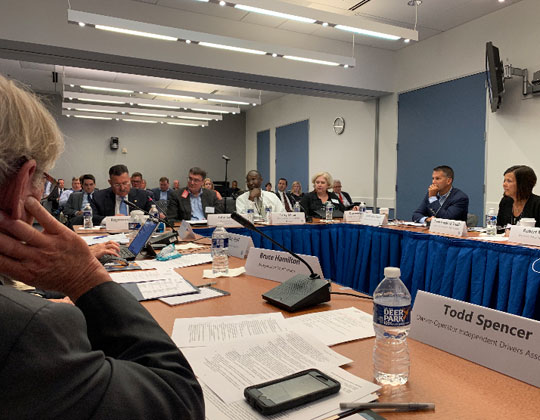OOIDA’s Spencer: Maybe the regulations aren’t working
Serving as a member of the Motor Carrier Safety Advisory Committee, OOIDA President Todd Spencer told his fellow committee members that they need to look at the practical impacts on highway safety.
Spencer said that compliance and enforcement have never been higher but crashes are on the rise.
Maybe some of the rules that have been implemented are not working, Spencer told the committee. For instance, Spencer said the electronic logging device mandate, which went into effect in December 2017, has no safety benefits.
“No credible data has ever shown ELDs improve safety,” Spencer said.
The committee met Sept. 30 and Oct. 1 at the U.S. Department of Transportation headquarters in Washington, D.C., to discuss such topics as autonomous vehicles, hours-of-service regulations and general highway safety. The Motor Carrier Safety Advisory Committee is tasked with providing recommendations to the FMCSA administrator on motor carrier safety programs and motor carrier safety regulations.
Spencer helped provide the truck drivers’ perspective to the 17-member committee, which also includes representatives from the Teamsters, American Trucking Associations, law enforcement and safety groups.
Much of the meetings were dedicated to discussing FMCSA’s recent notice of proposed rulemaking that suggests five major changes to the hours-of-service regulations:
- The limits for short-haul operations would increase from 12 to 14 hours and from 100 air miles to 150.
- The adverse driving provision would allow a driver up to a 16-hour window within which to complete up to 13 hours of driving if the driver encounters adverse conditions.
- The 30-minute break requirement would be modified, prohibiting driving for more than eight consecutive hours without at least one 30-minute change in duty status. This would allow 30 minutes of on-duty, not driving time, off-duty time, or sleeper-berth time to qualify as a break.”
- In addition to splits of 10/0 and 8/2, drivers would be allowed a split-sleeper option of 7/3.
- Drivers would have the option of stopping the clock a minimum of 30 minutes and up to three hours consecutively once per duty period.
Some members of the committee argued that the changes could increase a truck driver’s workday by three hours.
Spencer told the committee that truck drivers do not want longer workdays and that the decision to stop the clock should be reserved only for drivers.
Jay Grimes, OOIDA’s director of federal affairs, who attended the meetings, said the committee had a difference of opinion regarding the hours-of-service proposal.
“The industry representatives were mostly supportive, and the safety advocates were on the other end,” Grimes told Land Line Now. “There was not much consensus reached, but there were some productive discussions and different perspectives on how each provision would be implemented and its impact on safety.”
The committee also discussed the development of autonomous vehicles. FMCSA issued an advance notice of proposed rulemaking regarding autonomous vehicles in May.
Spencer discussed the concerns over being able to keep a driver engaged if they are not “driving” the vehicle.
“It’s not like a light will go off and suddenly you’re going to be engaged,” he said.
Grimes added that the committee talked about several concerns involving autonomous vehicles, including cybersecurity.
“We’re seeing a lot of concerns, and there are so many questions right now,” Grimes said. “I think that’s why we’re seeing that it’s going to take quite a while before any of this technology really makes its way into the industry.”










